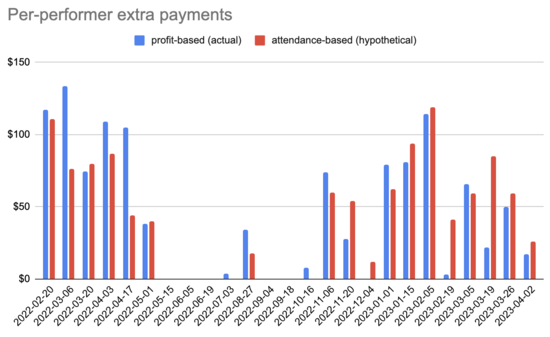Dance Profit Sharing |
May 8th, 2023 |
| contra |
I've been thinking about this, though, because the dance I help run does profit sharing. The idea is, we guarantee $125/performer and then if there's profit left over after fixed expenses half of it goes to the performers. I wasn't around for the initial implementation, but I think there were probably two reasons:
When a band or caller draws a big crowd that's something we'd like to encourage, and we're happy to share some of the rewards with them.
How much money we have available to pay performers depends on attendance. Profit sharing means that we pay performers more, to the extent that it doesn't risk our financial health.
You don't want to go too far in the direction of sharing risk, though, because the event has most of the responsibility for attendance and is also in a better position than many of the performers to take the loss from a low-turnout dance.
While I like this system overall, a major downside is that it requires you to determine how profitable this event was before paying the performers. I mean, it's possible to just pay everyone the guarantees and sort it out later, but that means following up with people to send additional payments, which might be relatively small. So you're filling out a pretty complicated form by hand at the dance after counting the money when you'd rather be dancing.
Could we get similar effects without needing to compute profit in the moment? What if we use attendance instead? Here's how payments would look with a bonus of $1 for every attendee over 120:
The main places where these two systems differ is in their handling of large and small bands. With the current system a duo is much more likely to get additional money than a quartet, because fixed expenses are two performers lower. While I do play in a duo and would be tempted to say otherwise, I don't see a general reason to pay smaller bands more.
Another nice thing about this structure is that it's easy to tweak to keep the dance financially healthy. The threshold or per-person amount could change in either direction, and it's much less of a big deal than changing guarantees.
I don't know if our dance will switch to this, but if we do I'll plan to post back in a year or so with how it's gone for us.
Comment via: facebook, lesswrong, substack
